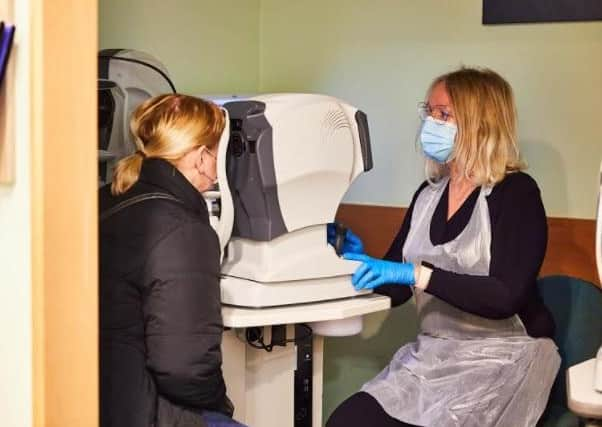Diabetes Week: Experts alert Hemel Hempstead residents to the warning in their eyes
and live on Freeview channel 276
Specsavers is highlighting the importance of regular eye tests and the warning signs to look out for which could help detect the diabetes during Diabetes Week (14 June, to June 20).
People with type 2 diabetes don’t always get any symptoms, which is why it can take up to 10 years for them to be diagnosed with the condition. However, if left untreated it can damage the heart, kidneys, feet and also eyes, which can lead to vision loss.
Advertisement
Hide AdAdvertisement
Hide AdDan Howarth, Head of Care at Diabetes UK, said: ‘Diabetes can affect your eyes in many ways and, for some people, it can lead to diabetic retinopathy which, if not treated in time, can lead to sight loss.


"It’s why all people over the age of 12 with diabetes are invited to regular diabetic eye screenings and we urge everyone to make sure they attend these routine checks.
"Normal sight tests are important too, as they have sometimes been known to pick up undiagnosed diabetes. Blurred vision could be a sign of an underlying condition, and one of the possible causes could be diabetes.
"Good eye health is really important and, for this year's Diabetes Week, we're reminding people to be aware of all the signs and symptoms of undiagnosed diabetes, which include going to the toilet a lot, being really thirsty and feeling tired.
Advertisement
Hide AdAdvertisement
Hide Ad"If you feel very unwell or your symptoms have come on quickly seek an urgent appointment with your GP or call NHS 111."
Diabetic retinopathy
A complication of diabetes is diabetic retinopathy which can occur when high blood sugar levels over a long period of time damage the blood vessels in the back of the eye.
If left untreated it can cause sight loss.
Specsavers clinical services director Giles Edmonds said: "In its early stages diabetic retinopathy usually doesn’t pose any noticeable symptoms, so an eye test can pick it up before you do.
"As the condition affects small blood vessels in the eye, damaging the retina, your optometrist can look for early characteristic changes, such as tiny leaks from these damaged vessels.
Advertisement
Hide AdAdvertisement
Hide Ad"As retinopathy develops, blood vessels can weaken, bulge or leak into the retina and can be referred to as non-proliferative retinopathy.
"However, if it worsens, some vessels can close off which causes new ones to grow, or proliferate, on the surface of the retina.
"This is known as proliferative retinopathy and can lead to problems with your vision and even sight loss.
"Some people who have diabetic retinopathy can also develop diabetic macular oedema.
Advertisement
Hide AdAdvertisement
Hide Ad"The macula is the part of your retina you need for reading, driving and seeing faces, however over time, the disease can destroy the sharp vision in this part of the eye leading to partial vision loss or even blindness."
He added: "At Specsavers, we offer digital retinal photography free of charge as part of a standard eye test for customers aged over 40.
"This takes a detailed picture of the back of your eye allowing the blood vessels to be monitored more closely – helping to detect any signs of diabetes that might be present."
As diabetic retinopathy is a serious condition it is also important to monitor any changes in your vision and get them checked out by your optometrist.
The warning signs include:
Advertisement
Hide AdAdvertisement
Hide Ad> Persistent floaters - Mr Edmonds said: "Floaters are spots in your vision and usually look like black or grey specs or cobwebs that drift about when you move your eyes.
"Most people will experience floaters in their vision at some point in their life – particularly as we reach older age as the jelly-like substance in our eyes becomes more liquid.
"If you notice more eye floaters than usual, a sudden onset of new ones, flashes of light in the eye or darkness on any side of your vision, you must get it looked at immediately as in some cases it can be a symptom of diabetic retinopathy.
> Blurred vision - "Blurred vision can be caused by many things and it is vital you get it checked out,’ says Mr Edmonds.
Advertisement
Hide AdAdvertisement
Hide Ad"Diabetes raises the risk of experiencing diabetic retinopathy where high blood sugar levels damage tiny blood vessels in the eye that sense light which can result in blurry vision.
"Blurry vision can also be a symptom of diabetes which can resolve when blood sugars start to reduce after diagnosis and starting treatment.
"It can also lead to dimmer vision, as if you’re wearing sunglasses, or struggling to see when it’s dark, which are important signs not to ignore."
Mr Edmonds added: "Many people do not realise that an eye test can detect so much more than just changes in vision, so it is important to keep regular appointments."